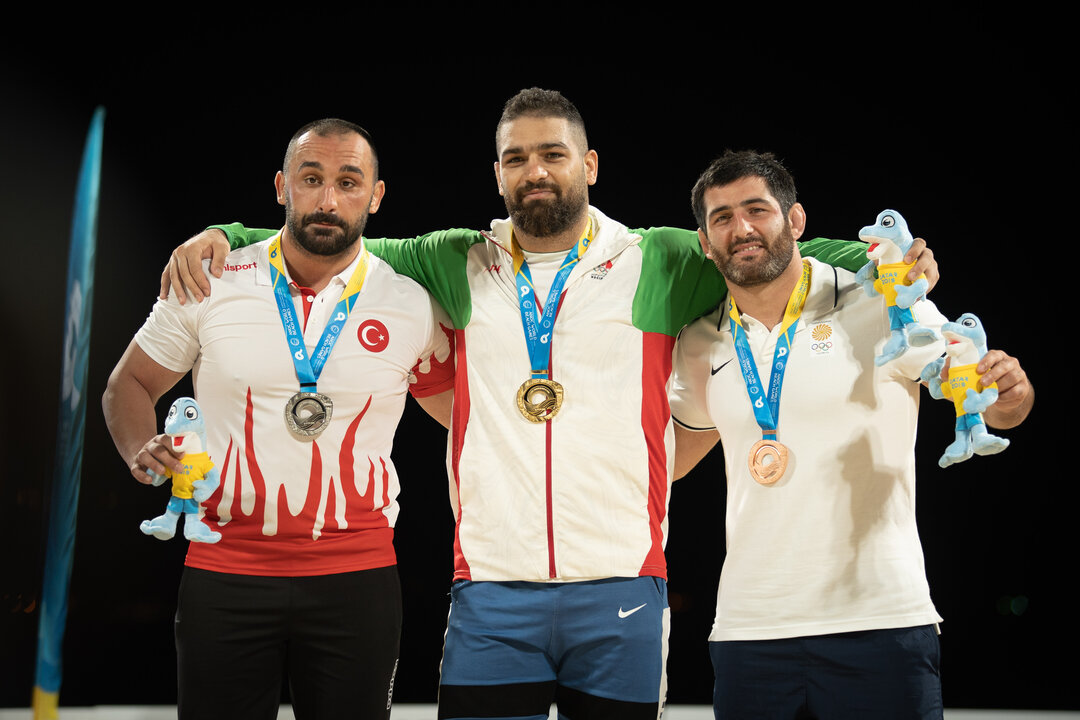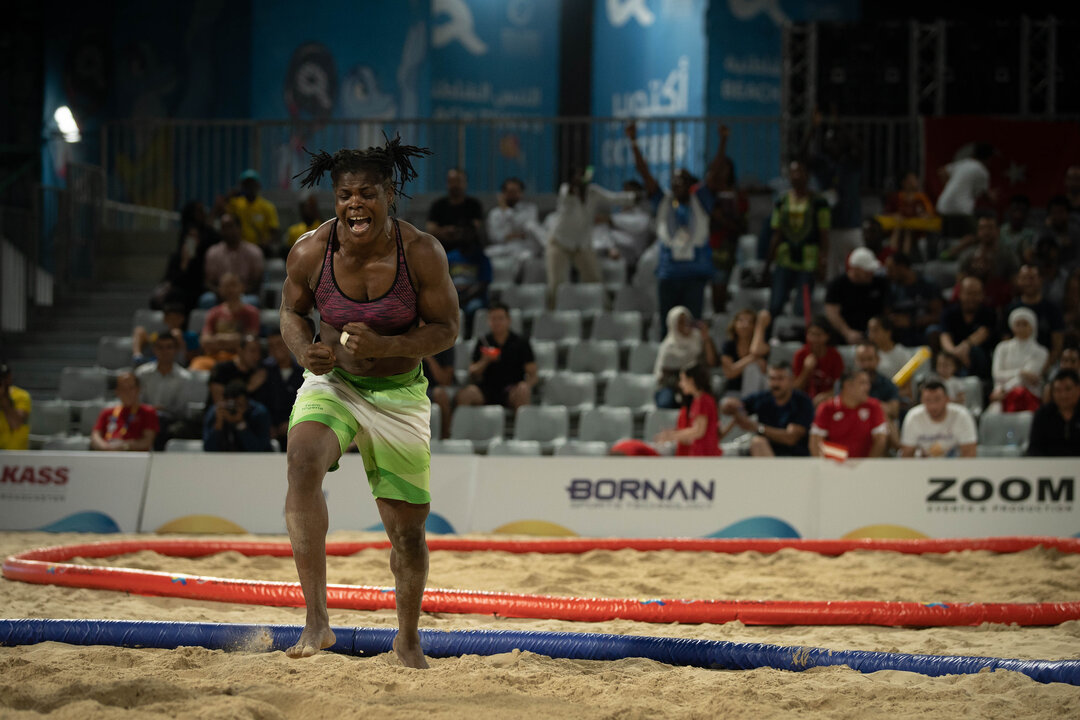BRATISLAVA, Slovakia (April 8) -- The European Championships enters day two with five Freestyle weight 61kg, 74kg, 86kg, 92kg and 125kg. Olympic champions Zavur UGUEV (UWW), Zaurbek SIDAKOV (UWW) and Magomed RAMAZANOV (BUL) will be in action.
WATCH LIVE | LIVE MATCH ORDER | DAY 1 RESULTS | SAITIEV TRIBUTE
Semifinals
61kg
SF 1: Zelimkhan ABAKAROV (ALB) vs. Arsen HARUTYUNYAN (ARM)
SF 2: Dzmitry SHAMELA (UWW) vs. Zavur UGUEV (UWW)
74kg
SF 1: Chermen VALIEV (ALB) vs. Aghanazar NOVRUZOV (AZE)
SF 2: Murad KURAMAGOMEDOV (HUN) vs. Zaurbek SIDAKOV (UWW)
86kg
SF 1: Magomed RAMAZANOV (BUL) vs. Sebastian JEZIERZANSKI (POL)
SF 2: Artur NAIFONOV (UWW) vs. Mahamedkhabib KADZIMAHAMEDAU (UWW)
92kg
SF 1: Miriani MAISURADZE (GEO) vs. Osman NURMAGOMEDOV (AZE)
SF 2: Dauren KURUGLIEV (GRE) vs. Feyzullah AKTURK (TUR)
125kg
SF 1: Giorgi MESHVILDISHVILI (AZE) vs. Dzianis KHRAMIANKOU (UWW)
SF 2: Solomon MANASHVILI (GEO) vs. Kamil KOSCIOLEK (POL)
14:05: In the final match of the session, Artur NAIFONOV (UWW) beats European U23 silver Rakhim MAGAMADOV (FRA). Naifonov is given a par terre advantage after Magamadov is cautioned for fleeing out-of-bounds on his knees. But Magamadov stunningly escapes from par terre with no damage. He is put on the activity clock and Naifonov gets another point for a 2-0 lead. Naifonov seems to have hit Magamadov in the head as he tried escaping a leg-attack. Magamadov calls for a medical timeout. In the second period, Naidonov gets a stepout and takedown to lead 5-0 and wins. He will face Mahamedkhabib KADZIMAHAMEDAU (UWW) in the semifinals.
13:56: Feyzullah AKTURK (TUR) puts in the work and beats Benjamin HONIS (HUN) 12-2 to enter the 92kg semifinal and will face Dauren KURUGLIEV (GRE) for the place in the final.
13:48: Zavur UGUEV (UWW) had to wait three hours for his first bout at 61kg but he makes sure to not get any surprises from Andrii DZHELEP (UKR). Uguev wins 11-1 to enter the 61kg semifinal.
13:46: Olympic champion Magomed RAMAZANOV (BUL) books his spot in the 86kg semifinal with a 10-0 victory over Matthew FINESILVER (ISR).
13:40: Zelimkhan ABAKAROV (ALB) got Nuraddin NOVRUZOV (AZE) in a lace and led 9-0 at the break in their 61kg quarterfinal. Novruzov tried getting back with a takedown but Abakarov sails through with an 11-2 win. He will face Arsen HARUTYUNYAN (ARM) for a place in the final.
13:30: No problems for Arsen HARUTYUNYAN (ARM) as he laces Leomid COLESNIC (MDA) and wins 12-2 to enter the semifinal at 61kg.
13:25: Zaurbek SIDAKOV (UWW) pulls off a 4-2 win over four-time European champion Tajmuraz SALKAZANOV (SVK). The 74kg marquee match saw Salkazanov begin with a bodylock but Sidakov was quick and defended it. Only a stepout for Salkazanov. Sidakov hits the leg attack which Salkazanov tries to defend with a chestwrap. Sidakov breaks it for takedown and two points. Sidakov leads 2-1 at the break. Second period is off to a flyer -- a leg-attack from Salkazanov, Sidakov with the defense. Both in a tangle and referee calls for the center. After dull phase, Sidakov hits a single leg attack and drives Salkazanov out of bounds which is called par terre but Sidakov challenges and get the stepout point for a 3-1 lead with a minute left.
Sidakov defends his lead but Salkazanov pushes his opponent towards the zone and gets a stepout as the time runs out. He challenges for fleeing but it's a normal defense. Sidakov gets a point for lost challenge and he wins 4-2 to enter the semifinal at 74kg.
13:17: Olympic bronze medalist and the favorite to win gold at 125kg Giorgi MESHVILDISHVILI (AZE) blanks Vlagyiszlav BAJCAJEV (HUN) 5-0 and moves on to the semifinals.
13:10: Olympic bronze medalist Chermen VALIEV (ALB) scores a quick 10-0 technical superiority win over Ramazan RAMAZANOV (BUL) at 74kg. We now have the big match between Zaurbek SIDAKOV (UWW) and Tajmuraz SALKAZANOV (SVK).
13:05: Dzianis KHRAMIANKOU (UWW) takes out Zelimkhan KHIZRIEV (UWW) 7-2 at 125kg. This weight class will have a champion not named Taha AKGUL (TUR) or Geno PETRIASHVILI (GEO) for the first time since 2012.
12:50: Former European champion Artur NAIFONOV (UWW) is up against European U23 champion Arsenii DZHIOEV (AZE). Naifonov gets the 1-0 lead after Dzhioev is put on the clock and he fails to score. Dzhioev is put on the clock in the second period as well and Naifonov's lead swells to 2-0. Dzhioev gets a point when Naifonov is put on the clock in the final minute. With 18 seconds remaining, Dzhioev tries to get a move on but Naifonov defends well and scores a 2-1 win.
12:35: Eugeniu MIHALCEAN (MDA) stuns Mahamedkhabib KADZIMAHAMEDAU (UWW) with an arm-throw for four at the start of the bout but Kadzi throws him off for exposure and two points in the same scramble. Kadzimahamedau seems a little hurt from Mihalcean throw and comes out blazing with a takedown and turn. He then adds a crafty throw for four to lead 10-4 at the break. A takedown and turn to finish the bout 14-4 and he moves into the 86kg quarterfinals.
12:20: Adlan VISKHANOV (FRA) defends and defends to beat Benjamin GREIL (AUT) 4-2 at 92kg. Viskhanov must thank Greil who challenged for an extra exposure from takedown but lost which put the French wrestler in a safe position of two-point lead in the final minute.
12:17: Olympic champion Magomed RAMAZANOV (BUL) and Osman GOCEN (TUR) go head-to-head in the 86kg pre-quarterfinals. Ramazanov gets the first point as Gocen fails to score when put on the activity clock in the first period. Ramazanov was about to be hit with passivity call in the second period but he scores a takedown just on time to stretch his lead to 3-0. Gocen slowly slips in keeping up with Ramazanov and gives up a takedown before going down 5-0.
12:15: World silver medalist Miriani MAISURADZE (GEO) takes his own time but wins 11-0 against Cezary SADOWSKI (POL) to advance at 92kg.
12:11: Olympic 86kg bronze medalist Dauren KURUGLIEV (GRE) at his best in defense he opens his European campaign with an 5-0 win over Ahmed BATAEV (BUL). He scored a stepout and point for activity in the first period. A stepout and takedown in the second period and won 5-0 at 92kg.
12:10: Andrii DZHELEP (UKR) with a beautiful suplex for five against Besir ALILI (MKD) and quickly rolls Alili to win 10-0 at 61kg. We will get the video of the move soon.
12:07: Arsen HARUTYUNYAN (ARM) is brutal when it comes to the lace. He marches on at 61kg with a 11-0 victory over Stilyan ILIEV (BUL).
12:00: Osman NURMAGOMEDOV (AZE), a world 92kg silver medalist in 2023, starts off with a 11-0 victory over Denys SAHALIUK (UKR) and moves into the quarterfinals.
11:50: Mahamedkhabib KADZIMAHAMEDAU (UWW) is at his first European Championships up at 86kg and faces Theodoros SINGIRIDIS (GRE) in first bout. Despite giving up a takedown, Kadzimahamedau looked strong at the weight as he gut wrenched Singridis for a 9-2 lead at the break. He made to work for the rest of the points but he manages to finish 13-2 for a technical superiority win.
11:42: In the first match at 61kg, former world champion Zelimkhan ABAKAROV (ALB) rolls to a 10-0 win over Nils LEUTERT (SUI) in just two minutes.
11:30: Zaurbek SIDAKOV (UWW), world champion at 74kg in 2023 and wrestling only at his second European Championships, begins with a 11-0 technical superiority win over Rasul SHAPIEV (MKD). He gets on the board with a point from activity clock and scored a takedown to lead 3-0 at the break. He needed only a minute in the second period to finish the match. He shoots deep and laces Shapiev for an three turns to win 11-0.
11:22: Mohsen SIYAR (GER) holds his head in his hands but he falls 8-8 to Zelimkhan KHIZRIEV (UWW) at 125kg despite a resounding comeback and crash into the digital scoreboard. Khizriev led 5-2 and Siyar had him struggling for conditioning. Siyar scored a stepout and both wrestlers crashed into the scoreboard which delayed the action. That proved to be a lifeline for Khizriev who bounced back, scored a out-of-bounds point, a takedown and held on to his 8-8 criteria lead for the win.
11:10: Adlan VISKHANOV (FRA) brings down Azamat ZAKUEV (UWW) in the 92kg opening round. Viskhanov got countered every time he scored a takedown but he hangs on for a 7-6 win, thanks to two successful challenges.
11:00: Vlagyiszlav BAJCAJEV (HUN), a mainstay at 97kg, has moved up to 125kg for the European Championships. He begins with a 8-2 victory over European U23 champion Gerogi IVANOV (BUL).
10:30: Welcome to the second day of European Championships. We have three Olympic champions wrestling. After the morning session, the semifinals will begin at 16:45 local time and then the medal bouts will begin at 18:00 local time.


Pouya RAHMANI (IRI), the 90kg champion, is joined by the weight's other two medalists, Ufuk YILMAZ (TUR) and Mamuka KORDZAIA (GEO) (Photo: Theo Lowenstein)
 Blessing ONYEBUCH (NGR) celebrates after defeating Zsanett NEMETH (HUN) in the over 70kg finals. (Photo: Theo Lowenstein)
Blessing ONYEBUCH (NGR) celebrates after defeating Zsanett NEMETH (HUN) in the over 70kg finals. (Photo: Theo Lowenstein) 

Share your thoughts.
Comments